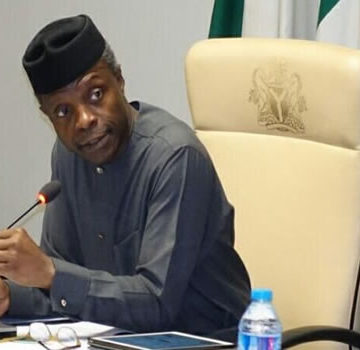
THE Vice President, Prof Yemi Osinbajo on Thursday, launched the Nigeria Water Supply, Sanitation and Hygiene (WASH) Poverty Diagnostic Report.
The report is expected to provide necessary inputs for the ongoing National Retreat on Revitalizing Urban Water Supply and Sanitation.
Osinbajo who declared open the retreat, in Abuja said the report gives an overview of the state of water supply, Sanitation and hygiene (WASH) services in the country.
According to him, the overview is based on a number of national data sources, desk reviews and original research to analyse service delivery in the country and assessment of the sector’s performance by the World Bank.
“The demand supply gap in the urban areas should not be allowed to continue as the population increases. Therefore, this retreat could not have come at a better time than now as the country just came out of economic recession and have urgent need for infrastructure development to meet the ERGP goals.
“The federal government on its part, will take the outcome of the retreat with all seriousness for the realisation of our collective desire to see that every Nigerian will have access to affordable water supply and adequate sanitation in a sustainable manner by the year 2030,” he assured.
He noted that the current administration places priority on infrastructure development in the sector hence the launch of the Economic Recovery and Growth Plan (ERGP) last April and the inauguration of the Presidential Council on Sustainable.
To this end, he urged delegates at the retreat to come with practical solutions that will rapidly improve access to pipe borne water and adequate sanitation in our urban areas.
Earlier, the Minister of Water Resources, Engr Suleiman Adamu, said the report gave a glimpse of the water supply and sanitation sector.
He said this was collated from the water supply and sanitation data that collected from all the 36 state and FCT.
“Nigeria’s water sector faces significant challenges with 61% of Nigerians having access to improved water, but only 31% have access to improved water on premises. Access to pipe water on the premises in urban areas has declined from 32% in 1990 to 7% in 2015.
“In the case of sanitation, only 29% of Nigerians have access to improved sanitation. The report went further to highlight that public expenditure in water and sanitation is limited and we need to invest at least three times more than we do today to achieve the SDGs in WASH,” he said.
He said the federal government, through recently approved water resources policy and the draft water resources bill, has demonstrated commitment to provide the enabling environment that will support and encourage private sector participation in the water supply and sanitation sector.
However, he noted that the draft water resources bill was being considered at the National Assembly.






